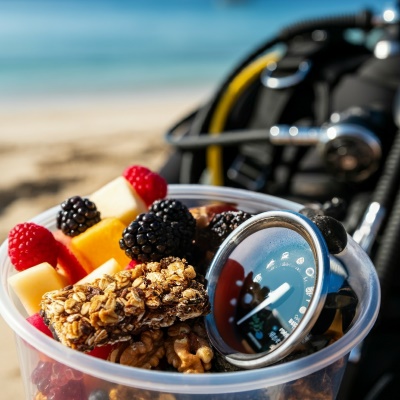
Imagine this: you're on a dream dive trip, exploring a vibrant coral reef teeming with life. You're eager to keep up with your dive buddy as they point out a hidden octopus, but your legs feel like lead and your brain is foggy. Turns out, that pre-dive feast of pizza and energy drinks wasn't the best idea.
Scuba diving might look effortless from the surface, but it demands both physical and mental energy. Just like any athlete, divers need to properly nourish their bodies to perform at their best and stay safe underwater. So, let's ditch those dinosaur chicken nuggets and dive into the world of scuba diving nutrition!
The Fuel for Your Fins: Why Nutrition Matters in Scuba Diving
Scuba diving isn't just a leisurely float in the water. It's a full-body workout that engages your muscles, challenges your cardiovascular system, and requires mental focus and decision-making. Proper nutrition plays a crucial role in:
- Energy Demands: Kicking those fins, navigating currents, and hauling gear around can burn a surprising number of calories. Eating a balanced diet with plenty of carbohydrates provides your body with the fuel it needs to power through your dives.
- Mental Clarity: Underwater, you need to stay alert, focused, and able to make quick decisions. A well-nourished brain is essential for clear thinking and problem-solving in potentially challenging situations.
- Thermoregulation: Water conducts heat away from your body much faster than air, making it easy to get chilled, even in tropical waters. Eating the right foods can help your body regulate its temperature and stay warm during your dives.
- Recovery and Repair: Diving can put a strain on your muscles and joints. Proper nutrition, especially protein, is crucial for repairing tissue damage and helping your body recover after a dive.
Pre-Dive Power-Ups: What to Eat Before You Submerge
So, what should you eat before you dive? Think of your pre-dive meal as charging your batteries for an underwater adventure. Here are a few tips:
- Carbohydrate-Rich Meals: Carbohydrates are your body's primary source of energy, so load up on complex carbs like whole grains, fruits, and vegetables. Avoid simple sugars like candy or pastries, which can lead to a quick energy spike followed by a crash.
- Timing is Key: Aim to eat your main meal 2-3 hours before your dive. This gives your body time to digest the food and avoid any uncomfortable stomach issues underwater.
- Hydration, Hydration, Hydration: Dehydration is a diver's worst enemy. Make sure you're well-hydrated before, during, and after your dives. Carry a reusable water bottle and sip on it throughout the day.
- Light Snacks: If you're planning multiple dives or have a long surface interval, pack some healthy snacks to keep your energy levels up. Fruits, nuts, yogurt, or granola bars are all good options.
- Foods to Avoid: Steer clear of heavy, greasy, or spicy foods before diving, as these can cause indigestion or stomach upset. Also, avoid alcohol and caffeine, which can dehydrate you and impair your judgment.
Post-Dive Refueling: Replenishing Your Energy Stores
After a dive, your body is like a car running on empty. It's time to refuel and recharge!
- Rehydrate: First and foremost, replenish those lost fluids and electrolytes. Water is essential, but you might also consider sports drinks or coconut water for added electrolytes.
- Protein Power: Protein is crucial for muscle repair and recovery. Include a good source of protein in your post-dive meal, such as grilled chicken, fish, beans, or tofu.
- Carbohydrate Replenishment: Your muscles rely on glycogen (stored carbohydrates) for energy. Replenish those glycogen stores with healthy carbs like whole grains, fruits, and vegetables.
The Diver's Diet: Everyday Nutrition for Optimal Performance
Even when you're not diving, a healthy diet is essential for maintaining your fitness and overall well-being. Here are a few tips for a diver's diet:
- Balanced Diet: Focus on whole foods like fruits, vegetables, whole grains, and lean protein. "Avoid processed foods, sugary drinks, and excessive amounts of saturated and unhealthy fats." [My WeighLess]
- Healthy Fats: Include healthy fats in your diet, such as those found in avocados, nuts, seeds, and fatty fish. These fats support brain function, energy levels, and overall health.
- Vitamins and Minerals: Make sure you're getting enough essential vitamins and minerals, especially vitamin D, iron, and magnesium, which are important for bone health, energy production, and muscle function.
- Supplements: If you're concerned about getting all the nutrients you need from your diet, you might consider supplements. However, it's always best to consult a doctor or nutritionist before starting any new supplements.
Fitness for Divers: Beyond the BCD
Scuba diving is a physical activity, so maintaining a good level of fitness is essential for optimal performance and safety.
- Cardiovascular Fitness: A strong heart and lungs will help you breathe easier and conserve air underwater. Aim for at least 30 minutes of moderate-intensity cardio exercise most days of the week.
- Strength and Flexibility: Strength training helps build muscle and improve your overall fitness, while stretching enhances flexibility and reduces the risk of injuries.
- Exercise Recommendations: Activities like swimming, running, cycling, and yoga are all great options for divers.
Fuel Up!
At Dive Right In Scuba, we believe that diving should be an adventure, not a food coma! By fueling your body with the right nutrients and staying active, you'll be able to enjoy longer, more enjoyable dives and explore the underwater world to its fullest.
So, ditch the junk food and embrace a healthy lifestyle that supports your passion for diving. Your body (and your dive buddy) will thank you!
Disclaimer: This blog post is intended for informational purposes only and should not be considered a substitute for professional medical or nutritional advice. Always consult with a qualified healthcare provider before making any significant changes to your diet or exercise routine.
